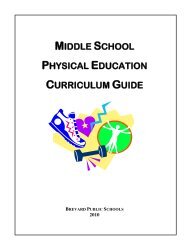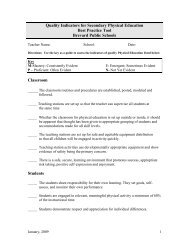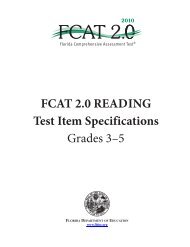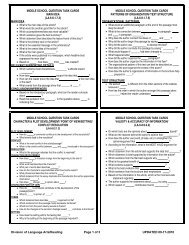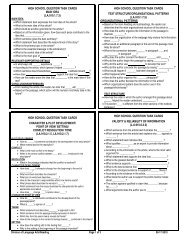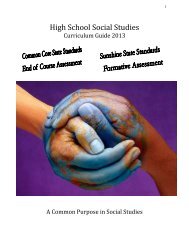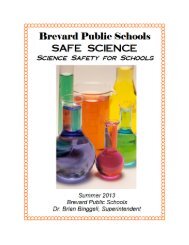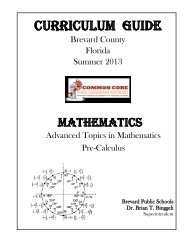Science Research Program Guide - Secondary Programs Home ...
Science Research Program Guide - Secondary Programs Home ...
Science Research Program Guide - Secondary Programs Home ...
You also want an ePaper? Increase the reach of your titles
YUMPU automatically turns print PDFs into web optimized ePapers that Google loves.
IRBs exist at federally regulated institutions (e.g., universities,<br />
medical centers, NIH, correctional facilities). Prisoner<br />
advocates must be included on the IRB when research subjects<br />
are at a correctional facility. The institutional IRB must initially<br />
review and approve all proposed research conducted at or<br />
sponsored by that institution. The Adult Sponsor and the local<br />
IRB are responsible for ensuring that the project is appropriate<br />
for a pre-college student and adheres to the ISEF rules.<br />
An IRB generally makes the final determination of risk.<br />
However, in reviewing projects just prior to a fair, if an SRC<br />
judges an IRB’s decision as inappropriate, thereby placing<br />
human subjects in jeopardy, the SRC may override the IRB’s<br />
decision and the project may fail to qualify for competition.<br />
6) The Affiliated Fair Scientific Review<br />
Committee<br />
A Scientific Review Committee (SRC) is a group of qualified<br />
individuals that is responsible for evaluation of student research,<br />
certifications, research plans and exhibits for compliance with the<br />
Rules and pertinent laws and regulations. Local SRCs may be<br />
formed to assist the ISEF Affiliated Fair SRC in reviewing and<br />
approving projects. The operation and composition of the local<br />
and ISEF-Affiliated Fair SRCs must fully comply with the<br />
International Rules.<br />
Any proposed research in the following areas must be reviewed<br />
and approved BEFORE experimentation: projects involving<br />
vertebrates and potentially hazardous biological agents. (Human<br />
studies reviewed and approved by a properly constituted IRB do<br />
not have to be reviewed by the SRC until the Fair competition.)<br />
ALL projects must be reviewed and approved by the SRC after<br />
experimentation and shortly before competition in an ISEFaffiliated<br />
Fair competition. (Projects requiring preapproval which<br />
were conducted at a regulated research institution (not home or<br />
high school, etc.) and which were reviewed and approved by the<br />
proper institutional board before experimentation must also be<br />
reviewed by the Fair SRC for rules compliance.)<br />
An SRC must consist of a minimum of three persons. The SRC<br />
must include:<br />
a) a biomedical scientist (Ph.D., M.D., D.V.M., D.D.S., or D.O.)<br />
b) a science educator<br />
c) at least one other member<br />
Additional Expertise: Many projects will require additional<br />
expertise to properly evaluate (for instance, extended<br />
knowledge of biosafety or of human risk groups.) If animal<br />
research is involved, at least one member must be familiar with<br />
proper animal care procedures. If the SRC needs an expert as<br />
one of its members and one is not in the immediate area, then<br />
documented contact with an external expert is appropriate and<br />
encouraged.<br />
In order to eliminate conflict of interest, the Adult Sponsor,<br />
parents, the Qualified Scientist, and the Designated Supervisor<br />
must not serve on the SRC reviewing that project. Additional<br />
members are recommended to help avoid this conflict of interest<br />
and to increase the expertise of the committee.<br />
A Scientific Review Committee (SRC) examines projects for the<br />
following:<br />
a) evidence of literature search<br />
b) evidence of proper supervision<br />
c) use of accepted and appropriate research techniques<br />
d) completed forms, signatures and dates showing maximum of one<br />
year duration of research and appropriate preapproval dates<br />
(when needed)<br />
e) evidence of search for alternatives to animal use<br />
f) humane treatment of animals<br />
g) compliance with rules and laws governing human, animal research<br />
and those involving potentially hazardous biological agents<br />
i) documentation of substantial expansion for continuation projects<br />
j) compliance with the ISEF ethics statement<br />
7) Other Review Committees<br />
Certain areas of research conducted in a regulated research<br />
institution require review and approval by federally mandated<br />
committees that have been established at that institution. These<br />
committees include:<br />
a) Institutional Animal Use and Care Committee (IACUC)<br />
b) Institutional Review Board (IRB)<br />
c) Institutional Biosafety Committee (IBC)<br />
d) Embryonic Stem Cell <strong>Research</strong> Oversight Committee<br />
(ESCRO)<br />
8) The ISEF Scientific Review Committee<br />
(ISEF SRC)<br />
A Scientific Review Committee exists at the Intel ISEF level. The<br />
ISEF SRC reviews the forms and the research plan for all projects<br />
to ensure that students have followed all applicable Rules.<br />
The ISEF SRC, like an ISEF Affiliated Fair SRC, is made up of a<br />
group of adults knowledgeable about research regulations. The<br />
ISEF SRC reviews the Checklist for Adult Sponsor (1), Abstract,<br />
Student Checklist (1A), <strong>Research</strong> Plan and Approval Form (1B)<br />
in addition to all other required forms for students who enter the<br />
Intel ISEF. They also identify problems local fairs may be having<br />
and work with fair directors and teachers to resolve them.<br />
A fair director or ISEF Affiliated Fair SRC member with any<br />
questions regarding the process, should contact the Society for<br />
<strong>Science</strong> & the Public or a member of the ISEF SRC. (See page 3.)<br />
The ISEF SRC is the final authority on projects that are qualified to<br />
compete in the Intel ISEF. In some cases, the ISEF SRC may have<br />
questions about particular projects. Usually, after students explain<br />
their procedures and research to the ISEF SRC, a simple corrective<br />
measure is prescribed (e.g., contacting the Designated Supervisor<br />
to confirm a detail, or rewriting an abstract for purposes of<br />
clarification).<br />
It is important that students retain all original signed forms. Do<br />
not send original forms to the Society for <strong>Science</strong> & the Public.<br />
Page 12 International Rules for Precollege <strong>Science</strong> <strong>Research</strong>: <strong>Guide</strong>lines for <strong>Science</strong> and Engineering Fairs / 2008-2009



